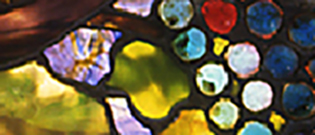WINTER PARK, FL—Beginning October 15, 2024, The Charles Hosmer Morse Museum of American Art will celebrate the 25th anniversary of the installation of the Tiffany Chapel at the Museum. In celebration of the chapel and its remarkable journey, the Museum is pleased to exhibit one of Louis Comfort Tiffany’s most significant glass mosaics, Fathers of the Church, on long-term loan from The Neustadt Collection of Tiffany Glass in Queens, New York.
Fathers of the Church, created for the 1893 World’s Columbian Exposition in Chicago, will be reunited with the chapel from Tiffany’s world’s fair display for the first time in over a century. The eight-foot-tall, 800-pound mosaic features three larger-than-life figures from early Christian theology. When the Chicago fair closed, Tiffany (1848–1933) displayed the mosaic in his Manhattan showroom as an example of his firm’s skill and innovation in the art of mosaic. Later, Tiffany moved the mosaic to Laurelton Hall, his Long Island estate and the repository for his most prized works of art.
The loan of the mosaic, an arrangement rarely undertaken by the Morse, allows visitors the unique opportunity to experience an additional facet of Tiffany’s vision as it was originally conceived for the 1893 world’s fair. The Museum will also open a companion exhibition, After the Fair, on October 15, 2024. This exhibition features archival objects, chapel fragments, and a chronicle of the chapel’s extraordinary journey from Chicago to the Morse Museum, with stops in New York City and on Long Island.
The Tiffany Chapel, designed to showcase Tiffany Glass and Decorating Company’s proficiency in ecclesiastical design at the 1893 world’s fair, was only the beginning of the chapel’s artistic and historical significance. From fires to floods, this Tiffany work might have been lost following the exposition’s close.
Jeannette Genius McKean (1909–89), founder of the Morse Museum, and her husband Hugh F. McKean (1908–95), the first Director and a former Tiffany Foundation fellow, traveled to Laurelton Hall following a devastating fire in 1957. The McKeans found the chapel in ruins and brought the columns and other structural elements to Winter Park. Over the next few decades, they acquired several components of the chapel, including leaded-glass windows, the altar, and the baptismal font.
In 1997, the Morse began a major conservation project to restore the Tiffany Chapel, using period accounts, photographs, and drawings. It opened to the public in April 1999 for the first time since its original debut at the 1893 World’s Columbian Exposition.
“This is a story of something that was loved but not lost. After the fair, the chapel could have been lost forever―left in ruins in the crypt of the Cathedral of Saint John the Divine, or destroyed by a fire at Tiffany’s mansion,” said Jennifer Perry Thalheimer, Morse Museum Director and Chief Curator. “The fact that it’s been here at the Morse for visitors to savor for 25 years is a miracle.”
The Morse Museum invites the public to join this special celebration of the Tiffany Chapel and its journey, beginning October 15, 2024. For more information about the chapel and the Morse, please visit www.morsemuseum.org.
The Morse Museum is home to the world’s most comprehensive collection of works by Louis Comfort Tiffany (1848–1933), including art and architectural elements from his Long Island estate, Laurelton Hall. The Museum’s holdings also include American art pottery, late 19th- and early 20th-century American paintings, graphics, and history of design objects.


